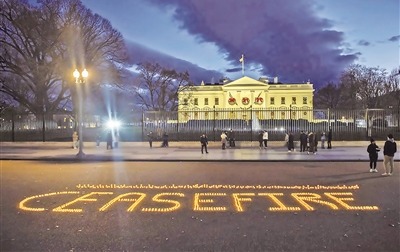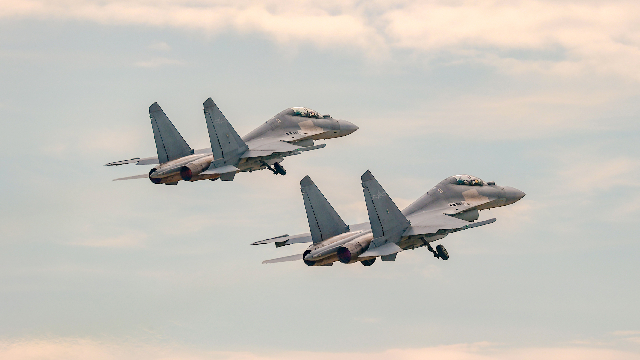
In early January, US people use candles to form the word "ceasefire" in front of the White House to criticize the Biden administration's Middle East policy.
US Secretary of State Antony Blinken concluded a week-long trip to the Middle East on January 11. This is Blinken's fourth trip to the Middle East within three months since the new round of the Palestinian-Israeli conflict broke out on October 7, 2023. This trip is intended to avoid further spillover of the conflict. However, Blinken did not propose any substantive measures during his visit, and the military actions of the US and Israel did not weaken as a result. The US efforts to put out fires in the Middle East with fuel will not only fail to stop the war, but may actually expand the war.
US' mediation rarely achieves results
Blinken visited Türkiye, Greece, Jordan, Qatar, the United Arab Emirates, Saudi Arabia, Israel, the West Bank and Egypt from January 4 to 11, 2024. The US Department of State issued a statement saying that Blinken's trip focused on the importance of the following matters. First, protecting the lives of civilians in Israel, the West Bank and the Gaza Strip. Second, ensuring the release of all remaining hostages. Third, working together to promote more and sustained humanitarian assistance to Gaza civilians and restore basic services. Fourth, ensuring that Palestinians are not forced to move out of Gaza.
However, according to foreign media reports, Blinken's trip to the Middle East did not achieve substantive results.
In Türkiye, the two sides did not issue any joint statement after Blinken met with Turkish Foreign Minister and Turkish President. According to Turkish media reports, Türkiye expressed strong dissatisfaction with the US' continued shipment of weapons to Israel and its support for Israel at the UN. The US' position on the Palestinian-Israeli conflict is incomprehensible to the Turkish government and people, the reports said.
In Qatar, Qatar's Emir (Head of State) Sheikh Tamimbin Hamad Al Thani emphasized when meeting with Blinken that a ceasefire in the Gaza Strip must be promoted as soon as possible to ensure regional stability and security. Senior Hamas officials also said that the US should reflect on its position because its support for Israel has delayed the conflict to this day.
Increased spillover risks
While Blinken is visiting the Middle East under the guise of promoting peace, the troops of the US and Israel are using actual actions to undermine security and stability in the Middle East.
On the one hand, the US has stepped up military operations. US Pentagon spokesperson Patrick Ryder said on January 4 that the US military launched an air strike in Baghdad that day, killing Mushtaq Talib al-Saeedi, the commander of the 12th Brigade of the PopularMobilization Forces.
The Washington Post commented that although the US has recently targeted locations associated with militia groups in Iraq and Syria, it is extremely rare for the US to carry out air strikes in central locations like the Iraqi capital. The action highlights the dangers of conflict spreading across much of the Middle East.
On the other hand, the Israeli troops have continued to attack key targets. Israeli Prime Minister Benjamin Netanyahu made a strong statement at a cabinet meeting on January 7: "The war must not be stopped until we achieve all the goals –the elimination of Hamas, the return of all our hostages and ensuring that Gaza will no longer pose a threat to Israel."
The role of disrupting the situation is highlighted
Judging from the recent situation, although the US appears to be trying its best to play the role of a "peacemaker" on the Middle East issue, its nature as a disrupter has been fully exposed.
On the one hand, US diplomatic efforts are unlikely to achieve results. Trita Parsi, co-founder of the USthink tank Quincy Institute for Responsible Statecraft, said that the US government's connivance of Israel's military operations in Gaza is the root cause of the current increasing tensions in the Middle East. What the US needs to do is not to promote peace hypocritically, but to put pressure on Israel. "If the US refuses to pressure Israel for a ceasefire, tensions in the Middle East will continue and a regional war that would involve the United States would ensue," said Parsi.
On the other hand, unlike previous conflicts between Israel and Palestine, the goal of US ally, Israel, is not just to weaken Hamas this time. The US troops stationed in Syria, Iraq, and other places and deployed in the waters of the region are in a "painful state of exposure". Since the new round of the Palestinian-Israeli conflict, multiple US military bases in the Middle East have been attacked more than 120 times.
Under the above circumstances, it will undoubtedly be very difficult for the troops of the US and Israel to stop military operations. It is reported that the US is having internal discussions on possible involvement in a new war in the Middle East. US intelligence officials are formulating plans to repel attacks on the US military by armed groups in Iraq and Syria and the US military is also preparing to attack the Houthi armed forces in Yemen. It is foreseeable that the US is most likely to play the role of "promoting wars" rather than "stopping wars" in the Middle East in the future.









